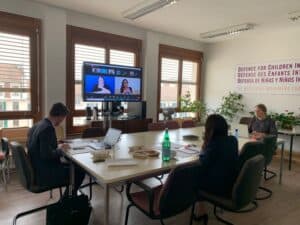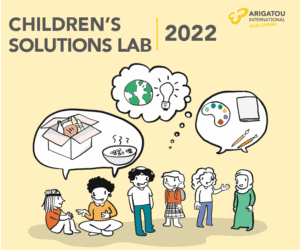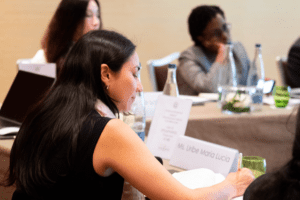
Investing in Integrated Services to Prevent and Respond to Violence against Children: A conversation at the margins of the Human Rights Council

More than 187 people tuned in for the panel discussion “Investing in Integrated Services to Prevent and Respond to Violence against Children,” held online on 17 March 2022 at the margins of the 49th Human Rights Council.
The event was organized by the Office of the United Nations Special Representative of the Secretary-General on Violence against Children and the Child Rights Connect Working Group on Children and Violence, composed of 17 civil society organizations, co-convened by Arigatou International – Geneva and World Vision International.
During the discussions, member states, UN entities, civil society and children themselves shared their experiences and perspectives on assessing the cost of violence, as well as the dividend paid by spending on effective violence prevention.
Ms. Maria Lucia Uribe, Executive Director of Arigatou International Geneva welcomed the participants highlighting the Working Group’s commitment to contribute to advancing the 2013 Agenda for Sustainable Development, in particular the goals and targets related to preventing violence against children.

The panel discussion was moderated by Dr. Najat Maalla M’jid, United Nations Special Representative of the Secretary-General on Violence against Children. In her opening remarks, she stressed how violence against children is increasing more and more, but at the same time, it is becoming less visible.
She ensured that all forms of violence against children can be stopped. “Yes, we can stop violence against children because we know what to do and how to do it. We need to invest in cross-sectoral integrated services that are child and gender-sensitive and inclusive, with access to all children, independent of their status,” she stated.
Speakers discussed how investing in integrated services to prevent and respond to violence against children is essential to realizing children’s rights, enhancing accountability and ensuring sustainable human capital development. They also highlighted the importance of mobilizing all key stakeholders, including children themselves.
“Decisions concerning our own safety and well-being, lie not in our hands, but in the hands of adults,” said Ojaswi, a 17-year-old girl from India, reflecting on how providing a platform for children’s meaningful participation is one of the biggest steps to ending violence against children by 2030. She called on decision-makers to listen to children and to include them in the discussions of issues that affect them. “We are not just your future, we children exist now and we are an as larger part of the present as you are (…) So include us, children, in the fight for our rights and well-being,” she concluded.
Januka, a young activist from Nepal, stressed that having policies and guidelines is not enough. The programs need to be implemented to have a real impact: “There is a strong base in Nepal for child participation, but we also face many challenges. Despite good guidelines and policies, the most challenging issue is implementation,” she explained.
Panelists also included Ms. Maria do Livramento Silva, President of the Cabo Verde Institute of Child and Adolescence, Ministry of Family, Inclusion and Social Development; Mr. Mohammed Meqdady, Secretary-General of the National Council for Family Affairs, Jordan; Ms. Dana Buzducea, Partnership Leader, Advocacy and External Engagement, World Vision International, and Mr. Cornelius Williams, Director of Child Protection, UNICEF.

During the discussion, panelists spoke of the devastating and long-lasting effects of violence on children, families and societies as a whole. Investing in integrated services for children was presented as a high-return solution, which must be seen as an integral part of implementing the Convention on the Rights of the Child and every government’s overall economic growth and development strategy. It is also a cornerstone of implementing the 2030 Agenda for Sustainable Development.
The full recording can be found HERE.
We thank the panel of speakers for sharing their knowledge, reflections and good practices; and the attendants, for their interest in stopping violence against children.
The post Investing in Integrated Services to Prevent and Respond to Violence against Children: A conversation at the margins of the Human Rights Council appeared first on Ethics Educations for Children.
The post Investing in Integrated Services to Prevent and Respond to Violence against Children: A conversation at the margins of the Human Rights Council appeared first on Arigatou International.

2nd Call of the Children’s Solutions Lab Launched

Arigatou International has launched the 2nd call for the Children’s Solutions Lab, inviting applications from the public throughout the month of March. In these applications, children’s groups (at least 4 children) around the world are invited to submit projects led by them that can propose context-sensitive and unique solutions to poverty affecting children in their communities. The projects are expected to address the ethical challenges and the cultural norms that can lead to poverty and suggest solutions for this based on education. These children can be attached to an organization, school, social club or place of worship. While the ideas are by children and implemented by children, adults in these groups/organisations will are encouraged to be available to support the children.
First launched in 2020, the the Children’s Solutions Lab aims to support young people in taking action to address poverty affecting children in their communities through solutions based on education. The Children’s Solutions Lab seeks to promote ethical reflections among children about the root causes of poverty and how some cultural norms can impact the wellbeing of children and, ultimately, lead to child poverty. Overall, aims create meaningful, participatory spaces and opportunities where children are empowered to lead, develop and implement relevant actions with regards to addressing poverty, through education.

Like in the first call, applications will undergo an international selection process though which 5 finalists will emerge. The 5 will be supported through a micro-grant and accompaniment from Arigatou International to implement their idea. The first Children’s Solutions Lab process attracted applications from 37 organizations, representing 23 countries. Five finalists from Cuba, India, Peru, Kenya, Serbia were selected and supported to implement their idea. The process reached to more than 2000 children.
By being part of the Children’s Solutions Lab, you contribute to the greater need to have children as active participants in issues affecting them and communities at large.
Apply to the Children’s Solutions Lab today: bit.ly/33XhTe4 or https://arigatouinternational.org/all-with-children/empowerment/children-solutions-lab/
The post 2nd Call of the Children’s Solutions Lab Launched appeared first on End Child Poverty.
The post 2nd Call of the Children’s Solutions Lab Launched appeared first on Arigatou International.

2nd Call of the Children’s Solutions Lab Launched

Arigatou International has launched the 2nd call for the Children’s Solutions Lab, inviting applications from the public throughout the month of March. In these applications, children’s groups (at least 4 children) around the world are invited to submit projects led by them that can propose context-sensitive and unique solutions to poverty affecting children in their communities. The projects are expected to address the ethical challenges and the cultural norms that can lead to poverty and suggest solutions for this based on education. These children can be attached to an organization, school, social club or place of worship. While the ideas are by children and implemented by children, adults in these groups/organisations will are encouraged to be available to support the children.
First launched in 2020, the the Children’s Solutions Lab aims to support young people in taking action to address poverty affecting children in their communities through solutions based on education. The Children’s Solutions Lab seeks to promote ethical reflections among children about the root causes of poverty and how some cultural norms can impact the wellbeing of children and, ultimately, lead to child poverty. Overall, aims create meaningful, participatory spaces and opportunities where children are empowered to lead, develop and implement relevant actions with regards to addressing poverty, through education.

Like in the first call, applications will undergo an international selection process though which 5 finalists will emerge. The 5 will be supported through a micro-grant and accompaniment from Arigatou International to implement their idea. The first Children’s Solutions Lab process attracted applications from 37 organizations, representing 23 countries. Five finalists from Cuba, India, Peru, Kenya, Serbia were selected and supported to implement their idea. The process reached to more than 2000 children.
By being part of the Children’s Solutions Lab, you contribute to the greater need to have children as active participants in issues affecting them and communities at large.
Apply to the Children’s Solutions Lab today: bit.ly/33XhTe4 or http://arigatouinternational.org/all-with-children/empowerment/children-solutions-lab/
The post 2nd Call of the Children’s Solutions Lab Launched appeared first on End Child Poverty.
The post 2nd Call of the Children’s Solutions Lab Launched appeared first on Arigatou International.

The Ethics Education Fellowship Program: Creating a Platform for Sharing and Building Capacity within Ministries of Education

Representatives from ministries of education, intergovernmental organizations, multilateral agencies, civil society organizations and research institutions are collaborating in the development of a fellowship program on ethics education.
The purpose of the Ethics Education Fellowship Program is to strengthen the capacity on ethics education in formal educational settings as a key contribution to developing national programs that foster learning to live together through intercultural and interfaith education. The Fellowship Program targets representatives from ministries of education or other government offices from six countries in Africa and Asia, that are interested in ethics education to foster learning to live together and social cohesion in their countries.

By creating a network of formal education institutions and a platform for sharing and building capacity within the ministries of education, the Fellowship Program seeks to promote a sustainable continuation and expansion of ethics education activities in the participating countries.
The partners include Arigatou International, Guerrand-Hermès Foundation for Peace – Global Humanity for Peace Institute, Higher Committee for Human Fraternity, KAICIID International Dialogue Centre, UNESCO Office for Eastern Africa and the UNESCO New Delhi Cluster Office; Indonesia National Commission for UNESCO – Ministry of Education of Indonesia; Kenya National Commission for UNESCO – Ministry of Education of Kenya, and Sri Lanka National Commission for UNESCO – Peace and Reconciliation Unit, Ministry of Education of Sri Lanka.
The project, which is being convened by Arigatou International – Geneva, was kicked off with a partners’ meeting in Geneva, Switzerland on 7 – 8 March 2022. Representatives from each partner organization participated in the meeting, where they had the opportunity to discuss the common vision of the collaboration. A technical team was formed to carry out the action plan of the Fellowship Program and its implementation. It is expected that national consultations will take place in each of the participating countries to assess needs and opportunities, and to define their scope of implementation. The first international capacity building workshop will take place in October this year, followed by national training workshops for educators, and subsequent implementation in schools. A review meeting will take place in 2023 to share experiences, lessons learned and further the project.

At the end of the meeting, there was general excitement about the diverse expertise of the partner organizations as well as the potential to contribute towards the implementation of the Sustainable Development Goals, notably target 4.7 which aims to support global citizenship education and a culture of peace.
This collaboration was initiated as a follow-up to the Global Symposium, Transforming Education held online on 22-23 November 2021.
We thank our partners for walking with us on this new project. We look ahead to helping promote ethics education into national education policy and programming to collectively contribute to building more peaceful, inclusive, and cohesive societies.

The post The Ethics Education Fellowship Program: Creating a Platform for Sharing and Building Capacity within Ministries of Education appeared first on Ethics Educations for Children.
The post The Ethics Education Fellowship Program: Creating a Platform for Sharing and Building Capacity within Ministries of Education appeared first on Arigatou International.

The Ethics Education Fellowship Program: Creating a Platform for Sharing and Building Capacity within Ministries of Education

Representatives from ministries of education, intergovernmental organizations, multilateral agencies, civil society organizations and research institutions are collaborating in the development of a fellowship program on ethics education.
The purpose of the Ethics Education Fellowship Program is to strengthen the capacity on ethics education in formal educational settings as a key contribution to developing national programs that foster learning to live together through intercultural and interfaith education. The Fellowship Program targets representatives from ministries of education or other government offices from six countries in Africa and Asia, that are interested in ethics education to foster learning to live together and social cohesion in their countries.

By creating a network of formal education institutions and a platform for sharing and building capacity within the ministries of education, the Fellowship Program seeks to promote a sustainable continuation and expansion of ethics education activities in the participating countries.
The partners include Arigatou International, Guerrand-Hermès Foundation for Peace – Global Humanity for Peace Institute, Higher Committee for Human Fraternity, KAICIID International Dialogue Centre, UNESCO Office for Eastern Africa and the UNESCO New Delhi Cluster Office; Indonesia National Commission for UNESCO – Ministry of Education of Indonesia; Kenya National Commission for UNESCO – Ministry of Education of Kenya, and Sri Lanka National Commission for UNESCO – Peace and Reconciliation Unit, Ministry of Education of Sri Lanka.
The project, which is being convened by Arigatou International – Geneva, was kicked off with a partners’ meeting in Geneva, Switzerland on 7 – 8 March 2022. Representatives from each partner organization participated in the meeting, where they had the opportunity to discuss the common vision of the collaboration. A technical team was formed to carry out the action plan of the Fellowship Program and its implementation. It is expected that national consultations will take place in each of the participating countries to assess needs and opportunities, and to define their scope of implementation. The first international capacity building workshop will take place in October this year, followed by national training workshops for educators, and subsequent implementation in schools. A review meeting will take place in 2023 to share experiences, lessons learned and further the project.

At the end of the meeting, there was general excitement about the diverse expertise of the partner organizations as well as the potential to contribute towards the implementation of the Sustainable Development Goals, notably target 4.7 which aims to support global citizenship education and a culture of peace.
This collaboration was initiated as a follow-up to the Global Symposium, Transforming Education held online on 22-23 November 2021.
We thank our partners for walking with us on this new project. We look ahead to helping promote ethics education into national education policy and programming to collectively contribute to building more peaceful, inclusive, and cohesive societies.

The post The Ethics Education Fellowship Program: Creating a Platform for Sharing and Building Capacity within Ministries of Education appeared first on Ethics Educations for Children.
The post The Ethics Education Fellowship Program: Creating a Platform for Sharing and Building Capacity within Ministries of Education appeared first on Arigatou International.






